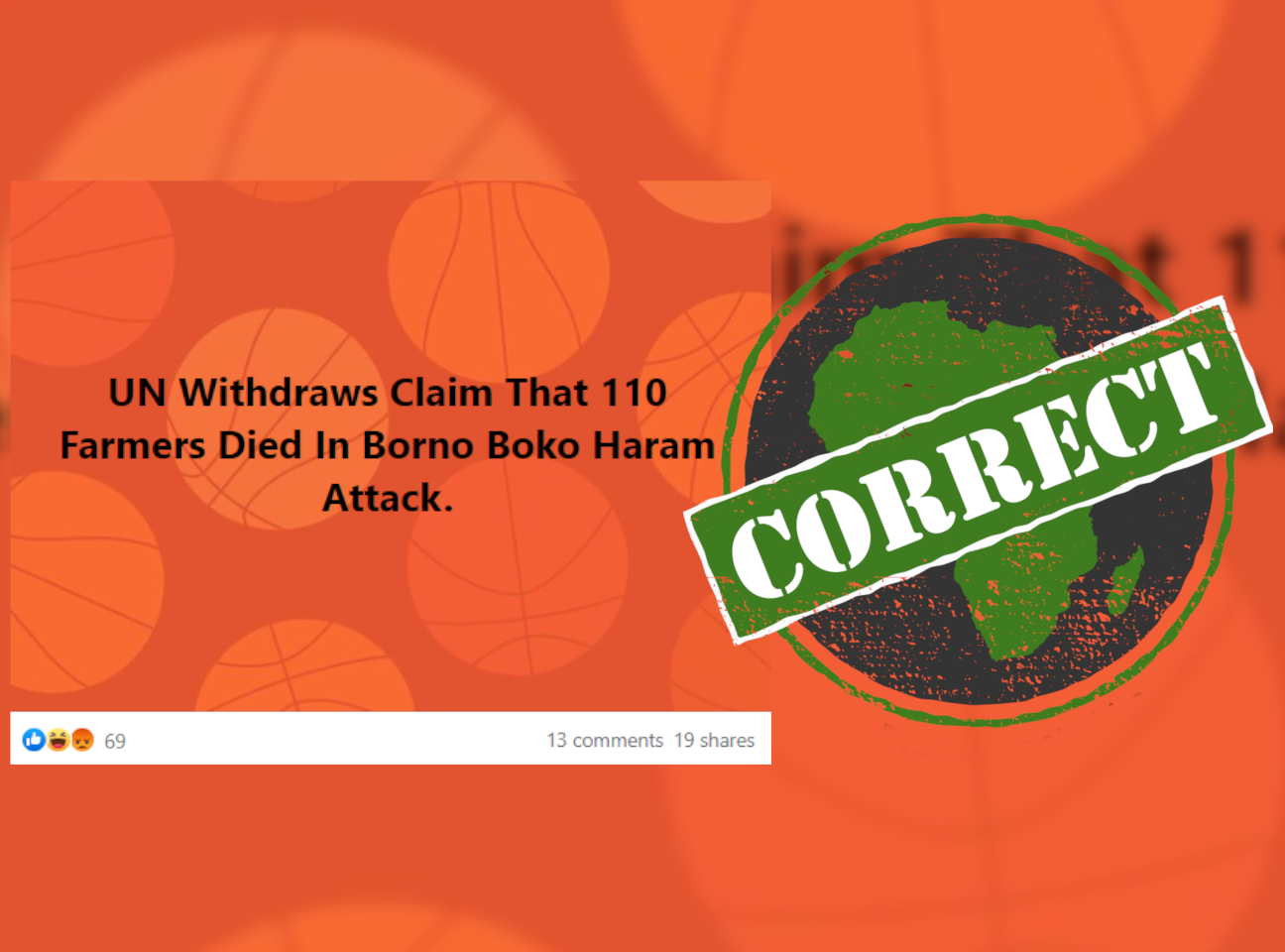“UN Withdraws Claim That 110 Farmers Died In Borno Boko Haram Attack,” claims a post shared on Facebook in December 2020.
In late November, Nigeria was hit with news of terrible killings in the conflict-ravaged northeastern state of Maiduguri. As is common with breaking news events, the early death toll reported varied, with some media saying 43 civilians had been killed, before this rose to 70.
A 29 November statement attributed to Edward Kallon, United Nations resident and humanitarian coordinator in Nigeria, claimed even more lives were lost – a total of 110.
The post was flagged as possibly false by Facebook’s fact-checking system, although others have also alleged that the UN had said its initial toll was inaccurate.
Has the international organisation withdrawn its claim?

Several media outlets in Nigeria have reported the UN withdrew its claim that 110 people were killed.
Eve Sabbagh, UN’s head of public information in Nigeria, was quoted as saying: “Please note the number of 110 civilians killed on Saturday’s attack is an unconfirmed number …”
The earlier statement from Kallon’s office has also been changed and now does not include a specific number.
It says: “Tens of civilians were ruthlessly killed and many others were wounded in this attack.”
Officials in the state placed the number of dead at 76.
According to media reports, the Boko Haram jihadi group has claimed responsibility for the brutal massacre.
A video allegedly from the group appeared to confirm reports that the attack was revenge after villagers handed over Boko Haram fighters to authorities. – Africa Check
In late November, Nigeria was hit with news of terrible killings in the conflict-ravaged northeastern state of Maiduguri. As is common with breaking news events, the early death toll reported varied, with some media saying 43 civilians had been killed, before this rose to 70.
A 29 November statement attributed to Edward Kallon, United Nations resident and humanitarian coordinator in Nigeria, claimed even more lives were lost – a total of 110.
The post was flagged as possibly false by Facebook’s fact-checking system, although others have also alleged that the UN had said its initial toll was inaccurate.
Has the international organisation withdrawn its claim?

110 civilians killed ‘unconfirmed’, said UN
Several media outlets in Nigeria have reported the UN withdrew its claim that 110 people were killed.
Eve Sabbagh, UN’s head of public information in Nigeria, was quoted as saying: “Please note the number of 110 civilians killed on Saturday’s attack is an unconfirmed number …”
The earlier statement from Kallon’s office has also been changed and now does not include a specific number.
It says: “Tens of civilians were ruthlessly killed and many others were wounded in this attack.”
Officials in the state placed the number of dead at 76.
According to media reports, the Boko Haram jihadi group has claimed responsibility for the brutal massacre.
A video allegedly from the group appeared to confirm reports that the attack was revenge after villagers handed over Boko Haram fighters to authorities. – Africa Check
Republish our content for free
For publishers: what to do if your post is rated false
A fact-checker has rated your Facebook or Instagram post as “false”, “altered”, “partly false” or “missing context”. This could have serious consequences. What do you do?
Click on our guide for the steps you should follow.
Publishers guideAfrica Check teams up with Facebook
Africa Check is a partner in Meta's third-party fact-checking programme to help stop the spread of false information on social media.
The content we rate as “false” will be downgraded on Facebook and Instagram. This means fewer people will see it.
You can also help identify false information on Facebook. This guide explains how.





Add new comment